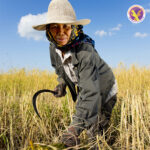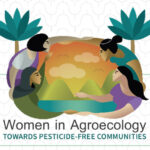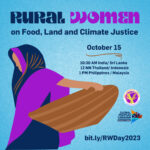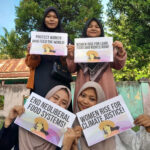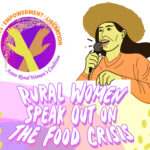Women and Food Sovereignty – The future we shall fight for in Rio and beyond
Sustainable development will only be achieved through social and gender justice, human rights and equity, and the pursuit of food sovereignty, not the “green economy”
Twenty years ago, the United Nations Conference on Sustainable Development in Rio, Brazil (also known as the Earth Summit) led to the forging of historic commitments from governments around the world to save the planet. This June, the Rio+20 Summit is being held to assess how much of the Earth Summit’s goals have been achieved, and to define measures that will chart the path towards sustainable development.
For women in agriculture in Asia, the promises of the Earth Summit have not been fulfilled. The over-all situation has grown from bad to worse for the world’s small-scale food producers. Majority of the world’s hungry (63% of total hungry) are in the food-producing region of Asia and the Pacific. Majority of whom (60% of total) are women.
The Green Economy falsely states that it serves sustainable development and poverty eradication. With the intensifying world financial and economic crisis, the Green Economy is anchored on the continuation of existing policies of neo-liberal globalization with capitalists desperately seeking new opportunities for profit. The Green Economy promotes the efficiency of managing natural resources for economic growth as it is defined by overproduction for market, and not by the planned economy of self-sustaining and sovereign communities and nations. It will strengthen the corporate intellectual property rights regime, commodifying natural resources in the guise of preventing its plunder. It will encourage private-public partnerships which will intensify the privatization of the land and natural resources. The Green Economy is not committed to seriously reducing the world’s carbon emissions, but only allows companies to pay their way out of their excesses through carbon trading. It entices corporations to further invest in agriculture in the guise of “greening” it through new technology. Monopoly capitalist forces are more determined than ever to squeeze super profits from the world’s land and natural resources, increasing efforts to ultimately derail or co-opt the quest for genuine sustainable development. They will only serve to further consolidate corporate control over agriculture, and promote even more harmful technologies. Furthermore, in the guise of calling them “environmentally harmful,” the Green Economy is against so-called “market distortions” in order to justify continued support to inequalities in the world’s economic trading system represented by the World Trade Organization.
Promoting sustainable societies that support women and men farmers is a key component to ensure sustainable development. There is a need to push for the alternative framework of food sovereignty and biodiverse ecological agriculture that is based on gender, economic, and ecological justice. In practice, this framework has made people-led sustainable development in many rural communities possible. There can be no sustainable development without a radical re-thinking of the concepts of growth, without serious criticism and reversal of the destructive neoliberal policies, and without the genuine participation of peoples’ and women’s movements.
The Rio+20 negotiations and the framework it presents must take into account the needs, demands and voices of women. The summit is a huge opportunity to push for gender-responsive policies and their implementation; various multi-level instruments that assure women’s rights, control and access to land and resources; strong health policies and programmes to ensure improved sexual and reproductive health and rights of marginalised women; and strong measures for the recognition and participation of women in all spheres of life. Due attention must be given to the protection and promotion of the health and well-being of women and their children; the rights and welfare of women farmers, agricultural women workers, indigenous women, fisherfolk and pastoralists; and protection against gender-based discrimination and violence.
It is high time to let the following demands reverberate in the Rio process and beyond and to reaffirm the struggle for the future we really want:
- Gender equality as an overarching principle of sustainable development. This should encompass the recognition of women’s contribution to agriculture, an economy that allows women to realise their human rights including in reproduction and health, and an end to gender discrimination.
- Put a definite target, measures and timeline on rural women’s access to land and other resources. Women must be assured of having equal right to access, own, control and benefit from productive resources and assets, including land, water, seeds, energy sources, livestock, fisheries, financial resources, public subsidies and appropriate technologies.
- Pursue gender-sensitive approach to sustainable development, recognising women’s role in harnessing nature and resource conservation, decision-making, and distribution. Ensure the active and meaningful participation and leadership of women in all decision-making processes, especially in defining sustainable development and in upholding women’s rights.
- Push for food sovereignty as crucial for sustainable development and eradication of poverty. Ensure the right to land and natural resources and genuine agrarian reform. Reject the unsustainable patterns of production and consumption, which have disproportionately affected women and are packaged now as the ‘green economy’. Communities should have the right to determine their patterns of food production and consumption, and farmers should be able to prioritise food production for domestic consumption.
- Promote and support smallholder agriculture that is built on local, indigenous and gender-based knowledge, employing biodiversity-based techniques and placing women at the core.
- Adopt the findings and recommendations of the International Assessment of Agricultural Knowledge, Science and Technology for Development, IAASTAD, as the basis for sustainable agriculture policies and to advance women farmers’ rights.
- Oppose the onslaught of corporate agriculture against small farms, biodiversity, ecology and all vulnerable sectors especially women.
- Hold agrochemical corporations accountable for their human rights violations, which include the rights of women and children, harm to human health, the environment, and farmers’ livelihoods, harassment and militarisation of farming and indigenous communities and scientists, violence against activists, and collusion with governments, and enact policies to this effect. World governing bodies must create international binding mechanisms to hold agrochemical corporations accountable for their human rights violations.
- Promote climate change solutions in agriculture that aim at building community resilience to climate change impacts through ecological and sustainable agricultural practices, the conservation of traditional local climate-tolerant crop varieties, the protection of biodiversity and natural resources, and ensuring full access to natural resources and necessary support for vulnerable communities. By no means must genetically engineered seeds, agrofuels, or other such corporate-driven measures be considered to any extent acceptable as it will erode biodiversity, expose people and the environment to undue risk of harm, and undermine farmers’ and consumers’ rights to safe food and a safe environment.
- Do not allow intellectual property rights on crops or on other living material. IPRs on seeds is a gross violation of farmers’ fundamental and inherent right to save, use, breed and exchange seeds.
- Adopt the Precautionary Principle and Polluter Pays Principle as policies in all matters related to sustainable development.
- Eliminate the use of highly hazardous pesticides and toxic substances and waste and support the IPEN’s, the network for a toxic free future, recommendations for Rio+20.
- Demand policies to support and encourage farmers to transition out of conventional chemical agriculture towards biodiversity-based ecological agriculture, thereby reducing their economic burden and exposure to hazardous chemicals.
- Reject the open endorsement of the World Bank’s principles of responsible agriculture investments (RAI). Instead, operationalise the Voluntary Guidelines on the Responsible Governance of Tenure of Land, Fisheries and Forests in the Context of National Food Security.
- Promote an agricultural research framework that is farmer-centered, promotes biodiversity-based ecological agriculture including the protection of traditional local crop varieties, incorporates traditional knowledge, and encourages farmer-scientist partnerships.
- Reject the WTO in food and agriculture. International trade and investment should be reoriented around rules that value, respect, protect and fulfill people’s rights. We call for more fair, transparent and open trading systems and, where appropriate, practices that contribute to the stability of food prices and domestic markets; prevent land grabbing; ensure access to land, water and other resources; and support social protection programmes.
- Assert the right to development in the context of social and gender justice, human rights and equity and the pursuit of food sovereignty!
Pesticide Action Network Asia and the Pacific (PAN AP)
AMIHAN National Federation of Peasant Women
Asian Rural Women’s Coalition (ARWC)
June 2012



